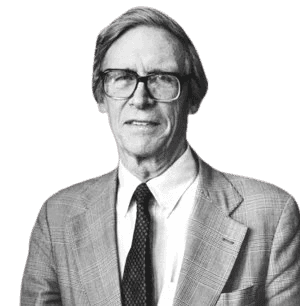Life and achievements
Early life
John Rawls was born into a well-off family in Baltimore, Maryland. His father was a lawyer, and his mother was affiliated with the League of Women Voters. Rawls was very close to his two younger brothers, who both died in childhood, and this significantly shaped his view of life. He went to Princeton University, and at first, he studied theology to become a minister. Still, he became a non-believer after serving in World War II in the Pacific front line.
After the war, Rawls attended Princeton University, where he received his Ph.D. in moral philosophy. He then joined Cornell University, the Massachusetts Institute of Technology, and finally, Harvard University, where he stayed for over thirty years. Rawls was born on February 21, 1921, in Baltimore, Maryland, USA, and he had personal and academic experiences that shaped his philosophy in justice, fairness, and the structure of liberal democracies. His thought process was formed due to his desire to fight for fairness and justice for all people so that every citizen of the country could have a decent life.
Legacy
John Rawls is one of the twentieth-century's most influential philosophers, and his work has informed political theory, legal scholarship, and public policy. His work, particularly A Theory of Justice, advanced a new perspective on fairness and justice in liberal democracies. Thus, with the help of the "veil of ignorance" and the "original position", Rawls proposed creating an institution that would benefit all the members of society, particularly the worst-off ones.
Rawls's impact on political liberalism is enormous as his theories define current discussions on the state, human rights, and justice. His idea of meritocracy, which states that inequalities are only acceptable if they are for improving the worst off, was revolutionary and shifted people's views on social justice. Later, in Political Liberalism and The Law of Peoples, Rawls extended his ideas to political legitimacy and international justice questions.
He also contributed to legal and constitutional theory and practice in the areas of human rights, constitutional law, and the state's obligations and responsibilities towards promoting equality. In the current political and philosophical discourses, Rawls's ideas are still highly relevant, thus vindicating his status as one of the most influential intellectual personalities of the twentieth century.
Milestone moments
May 16, 1971
The release of the book titled A Theory of Justice
John Rawls came up with A Theory of Justice, one of the most widely admired works in political philosophy.
In this work, Rawls described justice as fairness and proposed notions such as the original position and the veil of ignorance.
The book criticized utilitarianism and proposed theories that would protect the rights and freedom of individuals, with emphasis on those who were worst off.
Rawls's A Theory of Justice is an unprecedented work of modern philosophy that has been a starting point for any subsequent debate on democracy, fairness, and justice.
Feb 13, 1993
Publication of Political Liberalism
In Political Liberalism, Rawls developed his theories on justice further to address the issue of political acceptability in a diverse society.
He said that in a democratic society with different perceptions of the world, stability can be achieved only with the help of principles of justice that are acceptable to all citizens regardless of their opinions.
This work stressed the idea of public reason and how laws should be justified so that any rational citizen would accept them.
Rawls's ideas in this book influenced political theorists' thinking about the problems of democracy and tolerance in multicultural societies.
Apr 22, 1999
Publication of The Law of Peoples
John Rawls continued his work on justice by publishing The Law of Peoples.
He advocated for some key norms that should guide the conduct of states, including the rights of individuals, cooperation, and the sovereignty of states in protecting the vulnerable.
This work aimed to raise questions concerning justice in the world and the circumstances that can ensure the world's order.
Rawls's work has remained relevant in international political theory's ongoing debates about the world order and human rights.
Jan 16, 1980
Acknowledgements of Rawls's Impact on Legal and Political Theory
By the 1980s, John Rawls had emerged as one of the widely cited political philosophers in legal and political theory.
His ideas of justice are reasonably incorporated into constitutional and legal arguments, human rights, and the welfare state.
His work impacted many theorists and jurists who wanted to adopt his theory in the practice of political and social administration.
It thus helped establish Rawls as one of the most prominent philosophers in the academic world and political theorists in practice.
